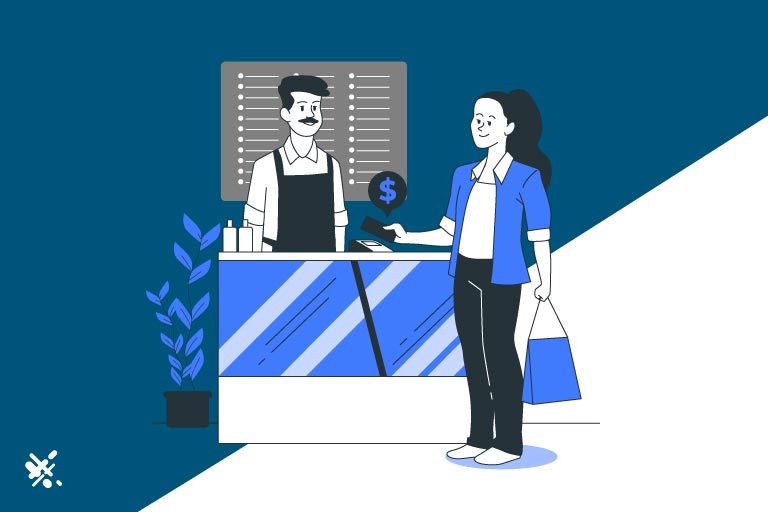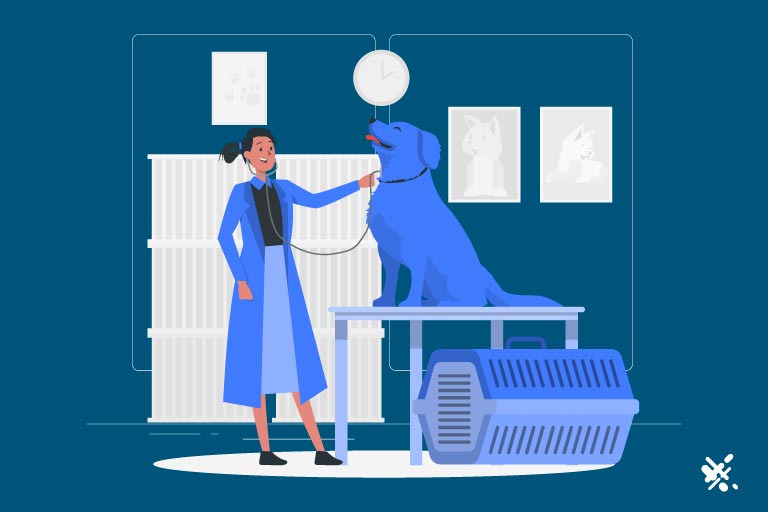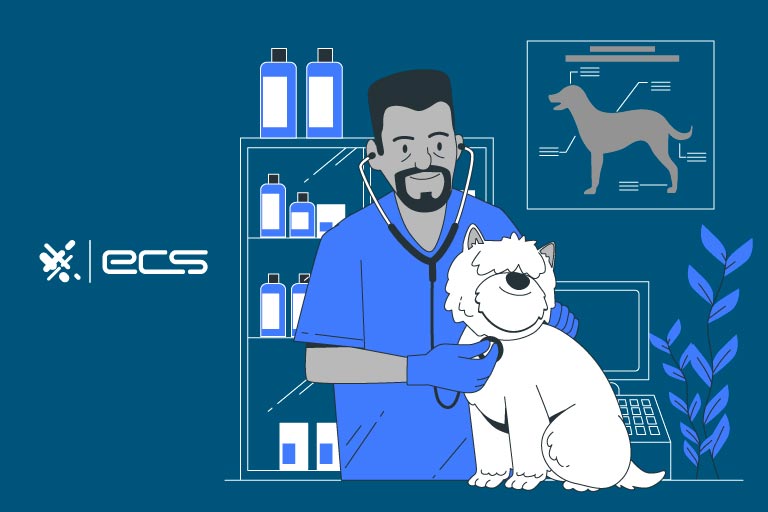Credit card processing for veterinarians. It’s the last thing you think about when starting a business to help animals. But If you’re a veterinarian that runs your own office, you already know how many moving parts there are; How much time and effort go into making everything run efficiently, so you can best serve your clients and their animals.
One area many clinics have trouble with is dealing with billing and payments. This area can often cause unnecessary friction which impairs the overall efficiency of a clinic’s operations. This is true for both your staff as well as customers.
One way to solve this problem is by choosing a credit card processor that fits perfectly with your industry and existing software or workflows.
A veterinarian’s office must also work with newer payment methods and trends that customers expect. This includes things such as mobile payments or other contactless payment methods.
Your office may also have a customer portal where clients can make payments. So your payment processing needs to integrate with those systems as well.
Of course, all of this needs to happen with the lowest processing fees and overhead possible to maintain margins.
Below, we’ll go over everything veterinarians need to be aware of choosing a merchant service provider and corresponding payment processor. We’ll start at the basics of payment processing and then move on to more advanced topics of in-clinic payment processing for veterinarians.
Payment Processing Basics
If you’re new to veterinary credit card processing, you may think of payment processing as a simple matter of just accepting credit cards. But payment processing involves a few different systems which need to all work together to provide seamless integration with your existing office software and workflows.
There are a few key elements of the payment processing workflow. So it’s important to understand the definitions and the differences between them.
Merchant Account
A merchant account is an account you open with a payment processor. You will generally access the other aspects of payment processing through this account. This is also where you will receive your funds when you accept credit card payments from customers. The funds are then deposited to a bank account you have on file.
Payment Processor
Your payment processor is the company who sets up your merchant account after you apply. The payment processor offers access to the various payment gateways. A good payment processor also helps you determine what equipment you may need. And the best way to integrate that equipment into your office systems.
A payment processor can also help you be compliant with customer data and PCI compliance rules. Overall, a trusted payment processor offers complete credit card processing solutions. It is generally who you will be in touch with the most during setup or to resolve problems.
For these reasons, your choice of payment processor plays a critical role in how easily and efficiently your billing works.
Payment Gateway And Provider
The payment gateway is how card information and funds are transferred from the customer’s issuing bank and your merchant account. The payment gateway provider allows access to the gateway and this access is generally resold through your payment processor.
There are several gateway providers you can choose from depending on your needs. You want a payment processor that works with the most popular gateways so that you have the most options. These options may include integration with your existing software as some software may only be compatible with one gateway.
So choosing a payment processor like ECS Payments that offers access to different gateways like Authorize.net or NMI gives your business the full flexibility it needs to run efficiently with any office management software you choose.
Point Of Sale (POS) Hardware
Payment terminals for veterinary practices or POS hardware will be the devices your office uses to physically capture card data for in-person transactions. This can include simple devices such as card readers and PIN pads. Or all-in-one units with screens and other features that employees can use in the reception area.
As a veterinarian, you’ll likely need these card readers to integrate with your existing billing and scheduling software. Popular gateways such as Authorize.net or NMI, both of which are offered by ECS Payments, integrate with most of the popular veterinarian management software suites.
If you’re a veterinarian who offers services outside of the office, such as to homes or farms, you may also need mobile card readers. There are several types of readers that can be used with smartphones and tablets.
Other options can include software installed on the phone or tablet to capture near-field data from cards without the need for a separate reader. Whichever method you need, your payment processor can assist you with which devices work best for your office or mobile needs.

How to Choose a Payment Processor For Veterinarians
One of the most important decisions when working with credit card processing is choosing a payment processor. As described earlier, you will apply for your merchant account with the processor. They then will become your main contact moving forward.
For veterinarians, there are key areas to be aware of when choosing a payment processor. We will go over those below.
Support
Customer service and support are the most important things to consider when choosing a payment processor for your veterinary practice. Medical-related billing can be complex and issues can arise. So you need a processor that has in-house staff available to help you should issues arise or if you need clarification on various topics.
Some payment processors don’t have dedicated staff to help customers, like ECS. Instead, they hand those duties off to another firm. Or simply refer customers to other companies within the payment processing workflow. These are all things to avoid. They can cost you money in the long run as your issues or questions go unresolved and payments are delayed.
Another issue is that veterinarian software vendors offer bundling with their own payment processing solution. The problem with this is that these vendors are not dedicated payment processors. This means they likely can’t offer assistance for certain billing issues beyond simple integration with their own software.
Monthly Fees and Transaction Fees
Of course, you want your merchant processing fees to be as low as possible. But you don’t want to sacrifice service or features when doing so.
When working with your payment processor it’s important to forecast your average ticket amount as well as your annual transactions. Each of these will help them determine the best offerings to secure you the lowest fees.
Another aspect is that certain features offered by payment gateways may not be needed by every veterinary practice. Some of these features require an additional monthly charge so knowing which ones you don’t need can save you money.
This can be another area where working with a payment processor can help save you money. They can listen to your specific needs. As well as offer advice on which features you need and which ones you likely don’t.
Deposit Timing
When card transactions are authorized at your veterinarian clinic, the funds are transferred to your merchant account. You then need to move those to your bank account. Funds can be available the same day or the next business day. But, sometimes, there can be fees for same-day withdrawals.
Depending on your business needs, you may require faster access to your funds to meet obligations. So make sure to discuss this with your payment processor to avoid any cash flow issues which could disrupt your clinic’s operations.
Accounting Software Integrations
Whether you plan on doing the accounting for your business yourself or have an outside agency do it, you’ll likely need your accounting records to be in a certain format. Of course, this will include the formats that your billing and invoicing data is exported.
Making sure these different formats have integration with your payment processing software can reduce tedious manual entry or the need to convert from one format to another.
When working with a payment processor, make sure to let them know all of the software integrations you require. Doing so will help them tailor a package that fits your existing business systems.
Help with Security Compliance
The typical veterinary clinic will likely require a certain level of point-of-sale security compliance. Credit card issuers have compliance guidelines that fall into categories of one through four, depending on transaction totals.
Most veterinarian clinics will fall between levels two and three. This requires certain questionnaires for self-reporting as well as scans of network infrastructure by an approved vendor.
A trusted payment processor like ECS Payments can offer assistance to make this compliance much easier. This means you can focus on running your clinic instead of mandatory security compliance issues.
Veterinary-Specific Processing Needs
Like other businesses, veterinarian offices have their own special requirements when it comes to payment processing. This has to do with various factors such as the typical transactions, the amounts, and how customers pay.

Mobile Payment Options
If you perform services outside of your office, either to farms or homes, you may need on-the-go payment processing for veterinarians. Some veterinarians even run mobile offices out of a truck or van. In these cases, you may need access to credit card processing while away from your office.
Accepting mobile payments may involve various Point of Sale (POS) hardware such as readers. It may also require processing software such as virtual terminals or similar software that you can connect to your office software for managing your billing.
Sometimes these payments can be accepted using a standard smartphone. Although, many professionals choose to use a dedicated tablet. The larger screen allows for easier transactions. Customers sometimes feel more comfortable with this as opposed to a personal phone being used for transactions.
If the device you are using has near-field capabilities (NFC), then a separate reader is often not needed. However, you may still want one as a backup.
Overall, if you plan on providing services outside of your office, as many veterinarians do, you should choose a payment processor that offers these options.
ECS Payments offers full integration with the latest mobile payment technologies from Apple Pay, Android, and more.
Virtual Terminals
Veterinarians and their staff often need to accept payments over the phone. For this, there are a few options and your payment processing needs to be able to work with each option.
The first and most common is a virtual terminal. It allows employees to manually run credit cards while on the phone with customers. These virtual terminals will be offered by your payment processor and gateway provider.
These differ from online payments where the customer enters their own billing information on a secure webpage. It is then submitted through the processing gateway.
A virtual terminal is used by the merchant and allows them to enter the billing information given to them over the phone.
However, some veterinarian offices may use practice management software which has specific modules for accepting payments. In these cases, the software must be integrated with your payment gateway so that information can be entered manually, which then transmits the information via the gateway for authorization and to collect the funds.
Some veterinarians may use a hybrid where they use both types of systems for manual payments.
Whichever your setup is, it’s important your payment processor understands your needs and can offer both a virtual terminal and full integration with your billing platform or office management software.
Integrations For Veterinary Offices
You likely already have office software or billing software you are currently using for your clinic. Or if you’re just starting, you may be deciding on which software to use to run and manage your office. These softwares will have integrated payment features that will need to be matched with your payment processing chain.
For example, certain gateways may only work with certain software or billing applications. You may also need more features for recurring billing if you have clients on payment plans or other similar services.
Your payment processor can help you in this area. But only if they offer the various options needed to integrate your existing business infrastructure.
Securing Customer Billing Information
Properly handling customer credit card information is critical to preventing fraud. There are rules and regulations that must be followed by all merchants when doing so.
These are known as the Payment Card Industry Data Security Standards or PCI DSS. There are essentially 12 rules and best practices that must be followed when handling or storing credit card data for transactions.
If your office keeps this information on file it will have to comply with these rules. One way to make that easier and offload some of the risks is to use features available through your payment processor and your payment gateway.
For example, Authorize.net and NMI payment gateways both offer services for veterinarians and other merchants to store customer card information on their secure servers. This means you don’t hold the customer information directly on your computers.
This may not be possible for all veterinarian offices depending on their billing workflow. But if you are interested in this, make sure to speak to your payment processor or contact ECS Payments for more details on how these features can help with your PCI DSS compliance.
Maximizing Revenue Through Payment Processing
Running a veterinarian clinic means providing the best care for animals and pet owners is the top priority. But at the same time, a veterinarian clinic is still a business, which means that profit margins and revenue must also be a priority as well.
Veterinarians can leverage the various features of advanced payment processing to maximize their revenue and even create new revenue streams they may not have been aware of.
Monthly Or Recurring Billing
Some veterinarian offices are offering monthly or recurring billing/memberships. These can be a concierge type of service, which is gaining popularity in various medical practices.
These monthly billing options can also be used to help with payment options or allow customers to extend the time needed to pay bills.
Advanced recurring billing tools available through your payment processor can help easily integrate these options into your business model.
Some of these tools include features such as automatic card updates which will automatically poll credit card issuers to detect changes in account information, such as expiration dates, and then update the billing information you have on file for those customers.
This means you never miss a payment and you never have to use your staff’s valuable time chasing down updated billing information from customers.

Opportunities For Upselling And Cross-Selling
If your office sells medication or other products, there is an opportunity to automate this process or even increase the ticket amount of each transaction.
This can be done by offering various additional products or services during the payment phase. These upsells or cross-sells are potent ways to increase lifetime customer value. Many customers also enjoy the opportunity to be exposed to additional products or services they may not have been aware of.
Additionally, you can integrate your payment processing into your website so that you can accept e-commerce payments for various items or services you sell.
You can use the same merchant account, payment processor, and payment gateway you already use. But the gateway is integrated with your e-commerce website and chosen shopping cart software.
Whichever option you choose, leveraging all your different options for accepting online payment processing for veterinarians can increase your revenue and customer lifetime value.
This is why choosing a leader like ECS Payments can be so critical. Their experts can explain all your options and help you integrate them all into your business model for maximum revenue growth.
Using Payment Processing Data To Improve Business Operations
Automation is key to any business for maximizing revenue and this is true when it comes to payment processing. You want your staff to focus on the most important tasks. So any minor billing tasks that you can automate will help your veterinary office run smoother.
We’ve already touched on some recurring billing tools your payment processor and gateway can offer. But there are other billing automation tools available as well. For example, the ability to integrate your credit card processing data with your preferred accounting software.
Once again, this is why choosing the right payment processing for veterinary clinics is so important. With personalized service, your payment processor can offer all the options you need to automate your billing as much as possible. Saving time and maximizing your staff’s efficiency.
Trends In Payment Processing For Veterinarians
Like most merchants, veterinarians are also noticing changes in customer trends when it comes to how they want to pay or manage their billing options.
Many customers prefer contactless payment options such as Apple Pay or similar services via their Android devices. Having the right POS hardware and terminals helps veterinarians accept these new payment methods and offer the most flexibility to their customers.
Recent surveys have shown as many as 75% of consumers now carry and use some form of a mobile or digital wallet. Being able to offer these customers the right payment solution can be critical to growing your business.
Payment processors such as ECS Payments specialize in these emerging technologies that allow veterinarians to leverage the latest payment trends for optimized revenue and growth.
If you need advice or information on any of these new payment methods or POS hardware, contact ECS Payments.

Final Thoughts on Payment Processing for Veterinarians
Choosing the right payment processor is one of the most important decisions for any business, and this includes vet clinics.
Without the right processing, you may leave extra revenue on the table. Customers also may be unhappy with the options they have when it comes to making payments.
Partnering with a trusted payment processor like ECS Payments helps solve these issues. We work with veterinarian clinics around the country. Helping them maximize revenue and automate billing with the latest processing tools.
Contact ECS Payments today to learn more about payment processing and how it can help your veterinary clinic succeed. And to learn more about ECS Payment Processing visit Credit & Debit.
